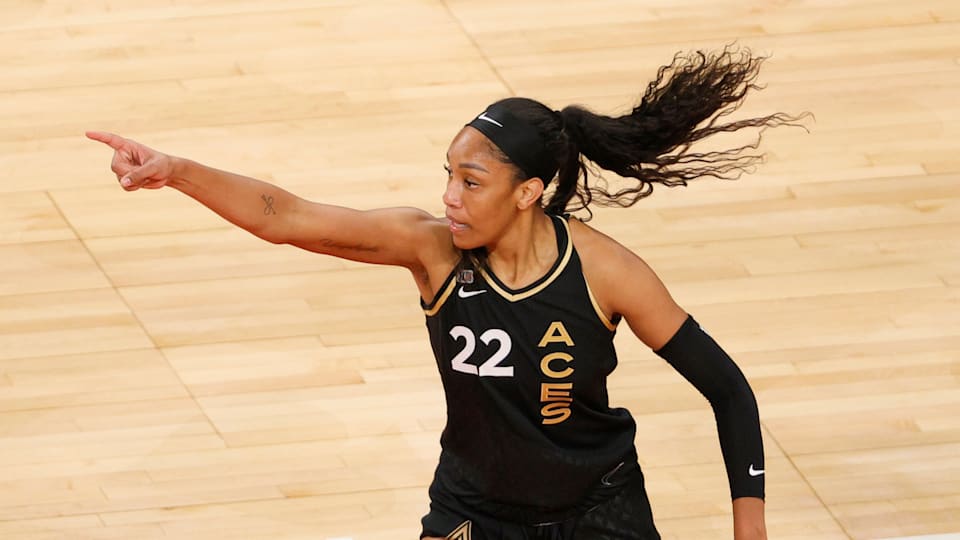
When A’ja Wilson was 13 years old, she was adamant that she did not want to play basketball.
She had no intention of following in the footsteps of her father, Roscoe C. Wilson Jr., who had played professionally in Europe for more than 10 years.
And as a youngster, she wasn't happy to find out that she had been signed up for a basketball day-camp during her summer break.
“I’ll never go! I’ll never be like you!” was her reaction, she told The Players Tribune.
But, it was at that same basketball camp when Wilson met current USA Women's basketball head coach, Dawn Staley, for the very first time, a figure that would become hugely influential in her growth as a player and as a person.
Fast forward to 2021, Wilson is a WNBA star and has been selected to represent Team USA in women's basketball at the Tokyo Olympic Games. It turns out that she’s grown to be a little like her father after all.
As well as being on a journey to love basketball 'on her own terms', Wilson has overcome significant struggles to be where she is now.
From dyslexia, a scare with vertigo, and mental health issues - she is now using her own experiences to help provide support and resources through the A'ja Wilson Foundation to those who find themselves in a similar situation.
A'ja Wilson's struggle with dyslexia
While growing up, Wilson was not too dissimilar to many other teenagers in trying to figure out who she was, what she wanted and, for her, where basketball would fit into that.
But academically, she was struggling.
Not only was she left feeling 'dumb', but teachers would tell her to 'try harder' or that she was just being 'lazy'.
In her sophomore year of high school, with the help of her parents, she was told that she had dyslexia; a learning difficulty.
Wilson saw it as a weakness, something that she didn't want to share with anyone else.
And as high school came to an end, she had become so successful in basketball that questions around her reading ability faded.
But then came college, and Dawn Staley.
“I honestly remember being in college when she [Staley] was named the head coach of the team I just started crying,” said Wilson.
“I just could not hold back the tears, because I was just so proud to be a player of hers."
Not only did she make the decision to be more open about her dyslexia, but Staley helped push Wilson outside of her comfort zone.
At one point, the head coach had Wilson reading scripture before games, and in persevering with it, helped her become more comfortable with her dyslexia and also with reading.
And that is just a glimpse into the special relationship she has with Staley, one that will be reunited this summer as she takes charge of the Team USA squad that Wilson will make her Olympic debut in.
Ever since she was the first pick in the 2018 draft, Wilson has been committed to helping young people and families with dyslexia through the foundation she opened with her parents, as well as working to combat bullying.
The A'ja Wilson Foundation
The AWF (A'ja Wilson Foundation), a nonprofit, has been active since 2019 and has two main priorities.
They aim to serve as a 'resource for children and families' who struggle with dyslexia and help them reach their full potential by making them feel empowered.
AWF works to 'change the culture' of students to help fight against bullying through education and mentoring.
Even though there are times when Wilson still struggles with her dyslexia, she says she is 'grateful' to have had the people she did around her to help work through it.
"It's tough, but I love that my foundation is here to continue to help raise money to help families and children get the resources that I had," she told CBS.
And giving back to others was always something that helped drive Wilson to become the player she is today.
"I knew as soon as I became a professional athlete, I wanted to change the game in a way that could benefit myself and also [other] people," she told Popsugar.
Although she used to struggle with asking for help, she now strongly believes that no one should be "afraid to need help because everyone needs it."
For Wilson, this is part of the legacy she is building to become a role model, both on the court and off it, which she hopes will include a Tokyo 2020 gold medal with Team USA in 2021.
